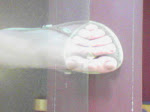Hybrid cars make me feel good. They seem like a step forward in a country that has, until recently, seemed like it hated the environment and considered it a natural foe to all things comfortable and fun. Hybrid cars, like the Toyota Prius and Honda Civic seemed to be changing all that.
And then I watched Who Killed the Electric Car? and it reminded me that, in many ways, the hybrids are a consolation prize given to those of us mourning the electric car, which was murdere by the oil companies, the federal government, the California Air Resources Board, the car companies (GM comes off looking particularly bad in this movie, which means I will never buy a car from them), and, I think, bad advertising. Do you remember how the electric car was marketed? As "the car of the future," and an awfully creepy future at that. Reasonable prices weren't offered, and the ads never showed how fast the electric car went. They showed it being stalked by kitchen appliances, or in the distance, as if the car hadn't arrived yet. As if the car was a dream. The electric car never seemed like a tangible reality to most people, especially since the car manufacturers chose to put in a less efficient battery in the car, limiting its range, when it had access to one that would have provided enough miles to calm most consumers' fears. Why the car companies built the electric car, except as a show of good faith to the zero emissions mandates that were starting to show up, only to sabotage it is beyond me...
Until you realize what the auto manufacturers have to lose. The doc depicts this really well, and it never occurred to me. If you have an electric car, your angle is how clean and energy-efficient it is. Which means... all your other cars... are evil. It's schizophrenic. By marketing this one experimental car as good, you'd be making all your other products look bad. This could be a potential profit problem, not to mention an image problem, and the manufacturers weren't ready and/or willing to convert them all.
So how did we get the Toyota and Honda hybrids? The Japanese auto manufacturers got scared because all the American manufacturers were making test models of these machines they had no intention of pushing on consumers. And as American manufacturers pulled back hybrids and electrics in exchange for Hummers and SUVs (grrr, we can run over your hybrid, grr), the Japanese produced the new, hot, lucrative car we've all come to know and love. Mmm, hybrids.
Republicans and libertarians say you can't force the government to force auto manufacturers to do the right thing. Free enterprise and all that crap. But without federal legislation, we wouldn't have seatbelts, airbags, or half the other implements that keep cars from killing us en masse. The White House suing California to drop their zero emissions mandate is, hence, the sickest thing I've ever heard.
No, I take that back. The push of coal, which is like telling someone you'll replace their malignant brain tumor with liver disease, the decision to drill in the Arctic Wildlife Preserve (a year of oil equals destroying nature? sure!), and all this hydrogen cell crap to appease the happily ignorant consumers who only know that oil seems to not be the best energy solution right now -- those are disturbing, too.
So, go watch Who Killed the Electric Car? -- your kids will someday have to watch it in school for history class...
I also watched Ocean's 13 last night as well. Mildly charming, but considering tonight's viewing, an egregious waste of time.
Subscribe to:
Post Comments (Atom)
In summing up, I wish I had some kind of affirmative message to leave you with. I don't. Would you take two negative messages?
-- Woody Allen

No comments:
Post a Comment